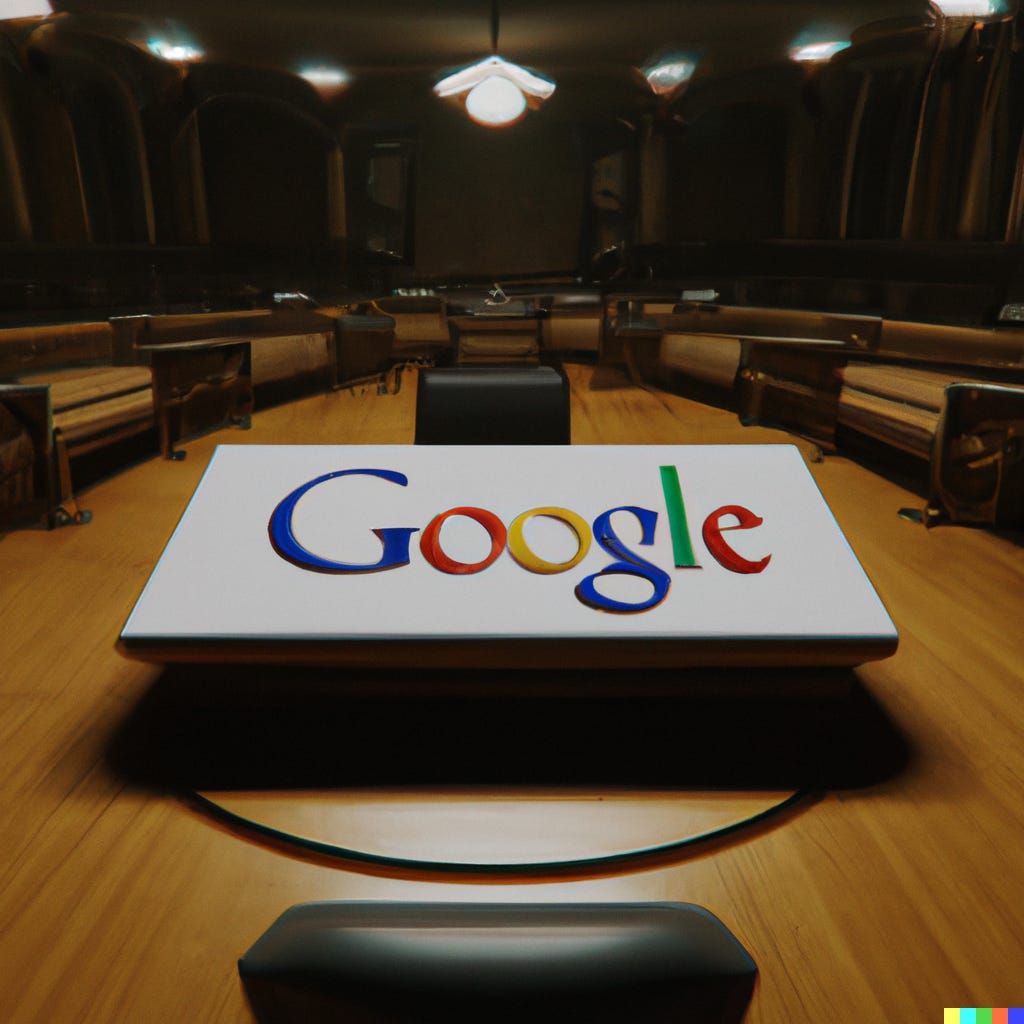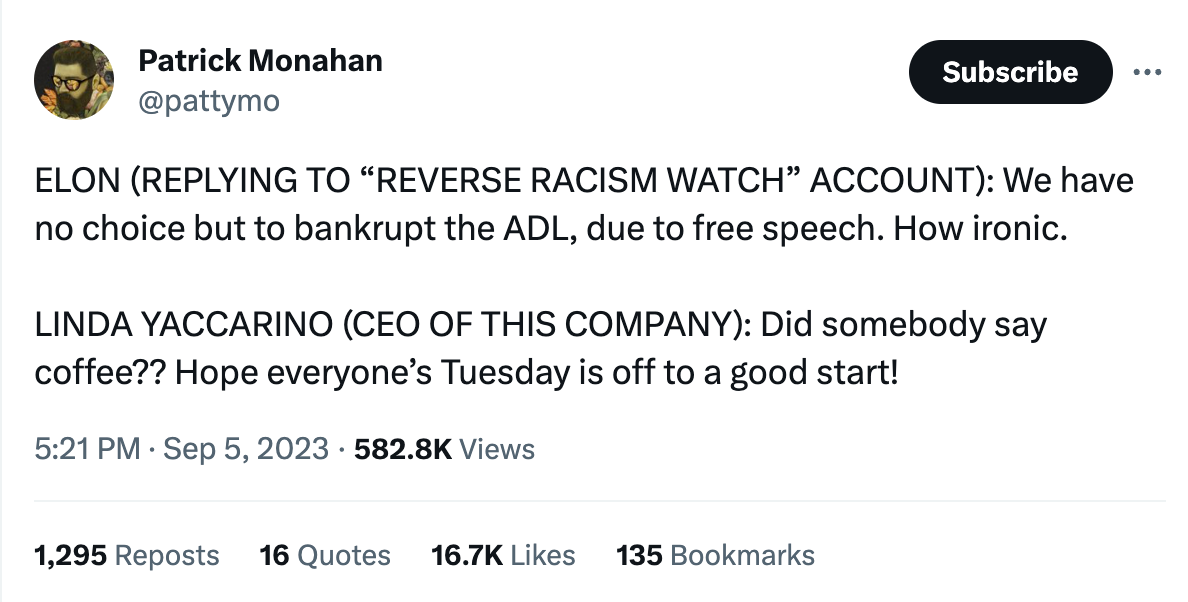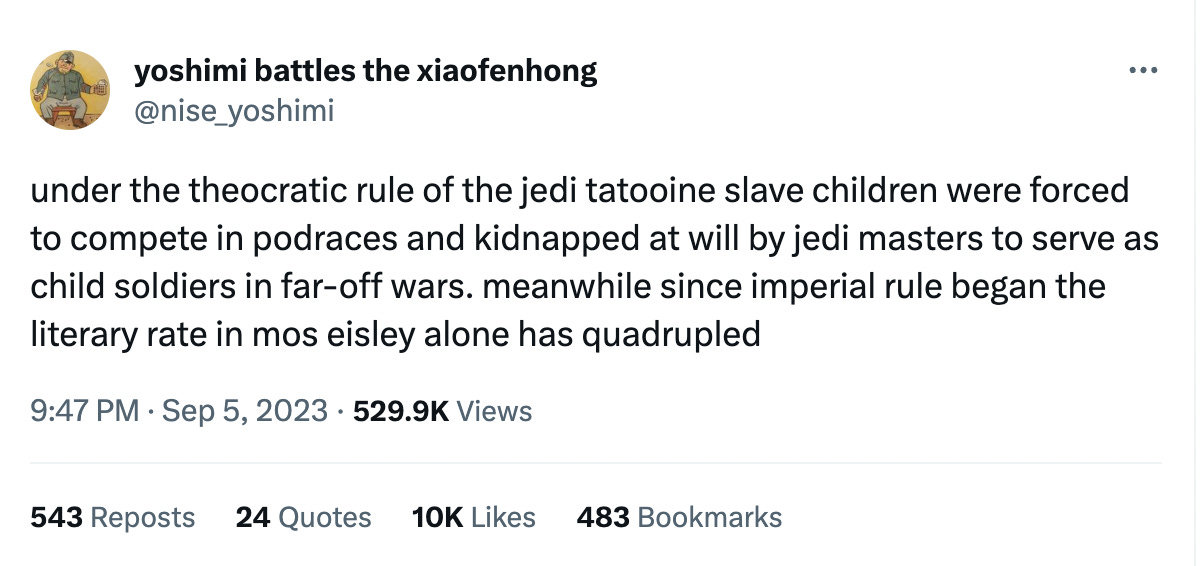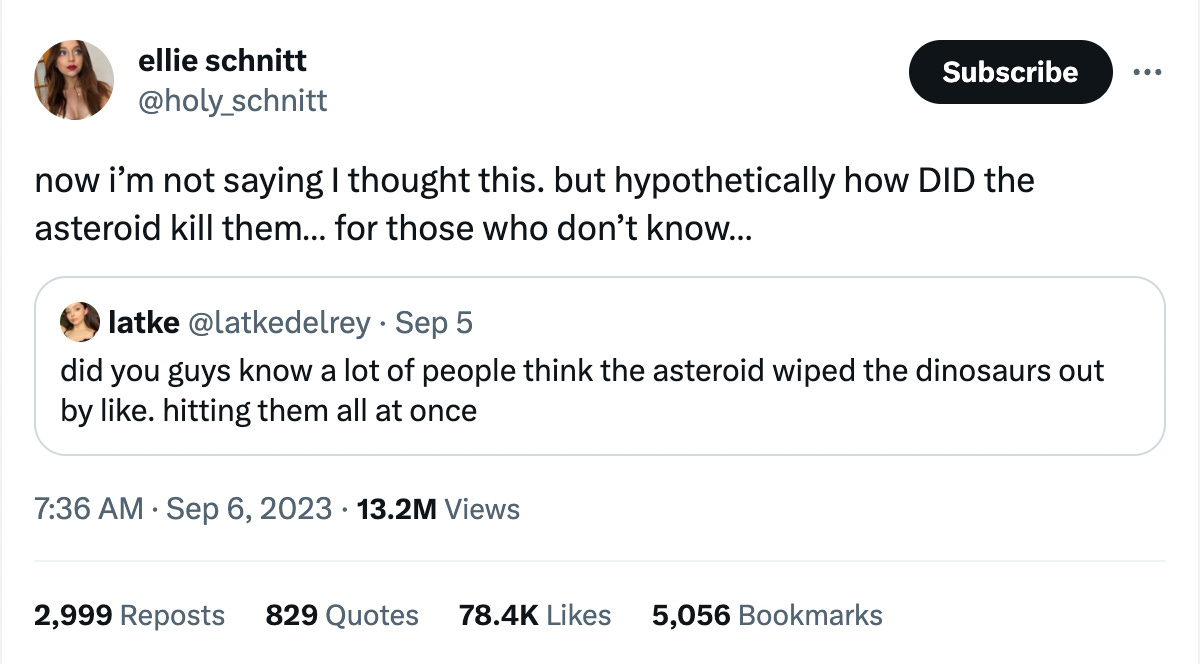Google goes to court
On the eve of a major antitrust trial — and its 25th birthday — the company is bracing for a fight
Today, let’s talk about the US government’s first major antitrust trial against a tech giant in a generation. If the Justice Department succeeds in its case against Google, it could lead to radical change around the web. But almost three years after the case was filed, it’s not clear that the government lawyers will be able to bend antitrust law far enough to secure a victory.
I.
On Oct. 20, 2020, the government formally accused Google of illegally maintaining a monopoly on its search and search advertising businesses. By striking deals with Apple, telecoms, and device manufacturers to make its search engine the default on their platforms, the government argued, Google illegally harmed competition and ensured that it maintains 80 percent market share or higher in search.
As I wrote here back then, there’s a reasonable argument to be made that deals like these create a barrier to entry in the search market. Neeva, an upstart search engine founded by an ex-Googler that shut down earlier this year after failing to catch on, was once valued at $250 million — but never could have dreamed of paying the estimated $18 billion a year that Google pays Apple for the privilege of being the default search engine on iOS.
The question now is whether Judge Amit P. Mehta, who will decide the case alone, will see things the government’s way.
As David McCabe and Cecilia Kang write in the New York Times, the Google case is almost certainly the most consequential US government lawsuit against a tech company since the Justice Department sued Microsoft for bundling its web browser with Windows in 1998.
At the same time, that Microsoft trial was a cultural event, featured on magazine covers and dominating headlines for months. By contrast, the Justice Department’s case against Google feels likely to be a much more sedate affair.
One possible explanation is that controlling the web browser was a much more consequential issue at the dawn of the internet age than search engine defaults are today.
Another is that the government’s case against Google here simply isn’t very good.
II.
Certainly Kent Walker doesn’t think the government’s case is very good. Walker, the company’s longtime president of global affairs, oversees Google’s legal defenses in the proliferating challenges it now faces around the world.
Walker’s argument goes something like this: Google paying for distribution is a standard marketing expense, not unlike a food manufacturer paying to promote their products at the end cap of a grocery store aisle. And those payments promote competition by funding the development of other browsers — Mozilla, for example, uses the revenue from Google to support Firefox and its other projects.
If you don’t like Google, you can typically switch the default search engine in your browser within four taps or fewer. And in places where Google isn’t the default search engine, Walker said, most people go out of their way to switch it back.
“The majority of people searching on Windows devices use Google,” Walker told me in an interview today. “Defaults matter, but they’re not determinative.”
Meanwhile, Walker argues, Google faces legitimate challenges to its dominance in search and search advertising. Amazon in particular has become a strong competitor there; it reported growing ad revenue by 22 percent over the previous year in its most recent earnings report. And the rise of ChatGPT and OpenAI’s emergence as a major consumer internet company present a new set of product and business challenges that Google has only begun to reckon with.
Google can push this argument too far, though. I’m willing to accept that TikTok and Reddit offer search alternatives of a sort to Google. But the company’s slide deck includes among its competitors in search such howlers as Wayfair.com, OpenTable, and ESPN. Ultimately, Google controls more than 80 percent of the search market, and its size and power exert powerful control over the web and how money flows through it.
The government has to prove that this state of affairs was achieved through illegal means, though. And reading through press coverage, I’m struck by how few of the quoted law professors seem willing to argue that the Justice Department is on firm ground here. If the government somehow manages to win the case, the consensus seems to be that it will be through a novel interpretation of the law.
And if it wins, then what? A strange thing about this trial is that the judge won’t consider any remedies unless Google is found liable. Perhaps he might bar Google from seeking distribution agreements like the ones it has on iOS. Perhaps, as some European regulators have done, he will require device manufacturers to ask consumers to choose which search engine they want to use. (This does not seem to have done much for Google’s competitors in Europe, for what its’ worth.)
Luther Lowe, Yelp’s chief lobbyist and a longtime Google antagonist, told me today that the judge could consider ordering a breakup of the company. “Given search’s centrality to its bottom line and the fact that a breakup is on the table, this case is an existential threat for Google,” he said.
That seems like a stretch. But perhaps the government will introduce evidence over the next few weeks that makes their case more strongly than the original lawsuit did.
On one hand, it seems totally reasonable to me to say that as a $1.7 trillion company, Google should be limited in its ability to maintain its dominance through acquisitions and multibillion-dollar distribution deals.
But the right way to do that was by passing one of the many laws on the subject that Congress considered over the past few years. Instead, and as usual when it comes to tech regulation, Congress did nothing.
If the Justice Department doesn’t win its case, the failure will be lawmakers’ as much as it is the government lawyers.
III.
The antitrust trial happens to arrive the same month as Google’s 25th birthday. “Search is still at the core of our mission,” CEO Sundar Pichai wrote in a blog post, “and it’s still our biggest moonshot with so much more to do.”
Earlier this year, it seemed like Google search might be in for the fight of its life. The introduction of chatbots powered by large language models threatened to prove more disruptive to Google than any other technology in the company’s history.
It’s too early to say definitively that Google has beaten its rivals. OpenAI is now on pace to generate $1 billion in revenue this year, driven mostly my the popularity of its GPT language models and subscription products, and is clearly growing quickly.
At the same time, market share for Microsoft’s Bing has remained mostly flat despite the high-profile launch of its GPT integration. And Google’s own introduction of generative AI into search and the standalone product have allowed it to mostly keep pace with its peers from a product standpoint, even if the company continues to be perceived as slower and more cautious (or boring) than OpenAI.
The bigger legal threat to Google, I believe, will come next year. That’s when the government will mount a much stronger antitrust case against the company, centered on its dominance of the digital advertising marketplace. And while AI clearly presents real business opportunities for the company, the prospect that its infinite output will overrun Google’s spam defenses means that there will be challenges as well.
For years now, I’ve hoped that something would arrive that would push Google to compete on fairer terms with its rivals and clean up its decaying search results. That moment arrived this year in the form of lawsuits and generative AI.
So far, though, Google has mostly met the challenge. A monumental antitrust case was not quite the 25th birthday party that Google might have wanted. Assuming it wins, though, it will have plenty to celebrate.
Want to hang out with me in person? Applications are open for this year’s Code Conference, hosted by me, The Verge’s Nilay Patel, and CNBC’s Julia Boorstin. Join us for live, on-stage journalism with X/Twitter CEO Linda Yaccarino, GM CEO Mary Barra, Microsoft CTO Kevin Scott, and many more speakers to come. It’s all happening September 26th and 27th at The Ritz-Carlton, Laguna Niguel. Follow the latest here.
On the podcast this week: Veteran burner, ex-Googler and Forward CEO Adrian Aoun details his harrowing escape from this year’s mud-pocalyptic Burning Man. Then, Anti-Defamation League chief Jonathan Greenblatt joins us to give extremely diplomatic answers about what it’s like to meet with Linda Yaccarino and then immediately be threatened by her boss.
Apple | Spotify | Stitcher | Amazon | Google
Governing
The U.K. government said it would not move forward with plans to scan the contents of messaging platforms for CSAM after several major providers, including Signal and WhatsApp, threatened to exit the market. A huge win for encryption and the right to privacy. (Cristina Criddle, Anna Gross and John Aglionby / Financial Times)
An in-depth report on Apple’s struggles to balance encryption with its attempts to stop the spread of CSAM highlights the inherent friction between the child safety movement and the privacy community. (Thomas Fox-Brewster and Alexandra S. Levine / Forbes)
California Gov. Gavin Newsom signed an executive order instructing state agencies to investigate how AI might threaten security and privacy while also authorizing employees to incorporate the tech into state operations. (Brad Stone / Bloomberg)
Google will require election advertisers to disclose when their ads contain any audio, images or video that has been altered or created by AI to bring more transparency to political advertising ahead of the 2024 election. (Davey Alba / Bloomberg)
The Pentagon intends to build a series of military AI systems and autonomous land, air and sea drones over the next two years to keep pace with China. (Nancy A. Youssef and Michael R. Gordon / WSJ)
China told all government officials to cease using iPhones at work and to surrender them at the office in favor of using China-owned brands like Huawei. (Yoko Kubota / WSJ)
A new report said China’s law requiring tech companies to inform the government of security flaws helps the country’s state-sponsored hackers target victims with cyberattacks and espionage. China collects vulnerability disclosures and shares them with several agencies with links to hacking operations. (Andy Greenberg / Wired)
EU regulators opened investigations to determine whether Microsoft’s Bing and Edge browser, as well as Apple’s iMessage and iPad operating system, fall under the purview of the new Digital Markets Act. (Samuel Stolton / Bloomberg)
Amazon is set to go to court in its FTC antitrust lawsuit later this month after the e-commerce giant refused to offer any concessions to regulators in pre-trial talks. (Dana Mattioli / WSJ)
The U.S. Senate voted to approve Anna Gomez, a former senior advisor at the Bureau of Cyberspace and Digital Policy, as the fifth commissioner of the FCC. Three years into the Biden presidency! (Linda Hardesty / Fierce Wireless)
YouTube won a lawsuit against a prominent anti-vaccine activist who sued the company for removing his videos, with the judge ruling that YouTube “had the discretion to take down content that harmed its users.” (Ashley Belanger / Ars Technica)
Pinterest updated the algorithms underpinning its recommendation and search features with an AI-powered system that can recognize different body types. (Paresh Dave / Wired)
Civil rights groups are banding together with the Anti-Defamation League and the Center for Countering Digital Hate to mount a counteroffensive against Elon Musk’s attacks and legal rights. (David Ingram / NBC News)
An investigation into Musk’s Twitter takeover revealed how many of the impulsive decisions he’s made around content moderation were done as personal favors to friends and acquaintances like Marc Andreessen and Kanye West. (Georgia Wells, Alexa Corse and Kirsten Grind / WSJ)
X expanded its Community Notes moderation feature to videos and said that user-added context will be applied to all posts that share the same video. (Ivan Mehta / TechCrunch)
Snap announced new features and policy changes designed to better protect teens, including in-app warnings when adding strangers as friends and a new strike system for banning accounts that post harmful content. (Sarah Perez / TechCrunch)
Google said it will allow real-money games on the Play Store in India after the conclusion of a year-long pilot program that ends on Sept. 28. The company is setting up a new regulatory framework to approve apps for the segment, which accounts for more than 75% of gaming revenue in India. (Moneycontrol)
A new report from Mozilla found that newer automobiles from every major car brand fail to adhere to basic security and privacy standards and collect troves of demographic data and personal info on drivers. Brands like Ford, Nissan and Toyota turn around and sell that data to third parties. (Thomas Germain / Gizmodo)
Grindr CEO George Arison gave employees an ultimatum to return to the office starting in October, and then fired the nearly 50% of workers who refused to do so. The ultimatum arrived two weeks after the company’s staff unionized. ( Caitlin Harrington / Wired)
Industry
A new book excerpt covers Elon Musk’s longstanding concerns about the AI industry reveals key disagreements with Google co-founder Larry Page and his eventual parting with OpenAI. Musk once tried to thwart Google’s acquisition of DeepMind in 2014 in part due to his conversations with Page about existential risk. (Walter Isaacson / Time)
OpenAI said it will hold its first ever developers conference in San Francisco this November, but CEO Sam Altman said not to expect an announcement of GPT-5 or GPT-4.5. (Rachel Metz / Bloomberg)
Andreessen Horowitz funded an open source AI project called Dolphin that’s billed by its creator as an “uncensored” LLM that won’t refrain from telling users how to commit suicide or plan genocide. (Emanuel Maiberg / 404 Media)
OpenAI competitor Anthropic added a paid subscription for its Claude chatbot that costs $20 per month in the U.S. and grants priority access to the platform alongside other features. (Emma Roth / The Verge)
The creator of the Drake and Weeknd deepfaked song “Heart on My Sleeve,” an anonymous music project known only as Ghostwriter, resurfaced with a new song “Whiplash” using the voices of rappers Travis Scott and 21 Savage. Ghostwriter also submitted “Heart on My Sleeve” for the Grammy Awards. (Joe Coscarelli / The New York Times)
Apple is expanding its budget to develop more advanced conversational AI for its consumer products to stay competitive amid the rapid development of new language models. (Wayne Ma / The Information)
Salesforce plans to pilot Slack AI, its new suite of generative AI features for the chat platform, later this year. One feature includes AI-generated summaries of channel conversations and more powerful search capabilities. (Mariella Moon / Engadget)
Meta’s Threads is rolling out the ability to search for posts in “most” English- and Spanish-speaking countries, with plans to expand the feature soon. (Emma Roth / The Verge)
Clubhouse announced a major redesign to pivot away from live audio and “be more like a messaging app” with a focus on voice messages and group chats. (Jay Peters / The Verge)
YouTube said it will no longer allow creators to control which types of ad formats, like pre-roll and skippable ads, are featured in their videos starting in November. (Jay Peters / The Verge)
Part of Google’s cookie replacement plans include a new Chrome API that targets ads based on browser history unless a user specifically disables it in settings. (Thomas Claburn / The Register)
Spotify is testing making its in-app lyrics feature exclusive to its Premium tier as the company looks for new ways to encourage subscription sign-ups. (David Pierce / The Verge)
Those good posts
For more good posts every day, follow Casey’s Instagram stories.
(Link)
(Link)
(Link)
Talk to us
Send us tips, comments, questions, and posts: casey@platformer.news and zoe@platformer.news.









